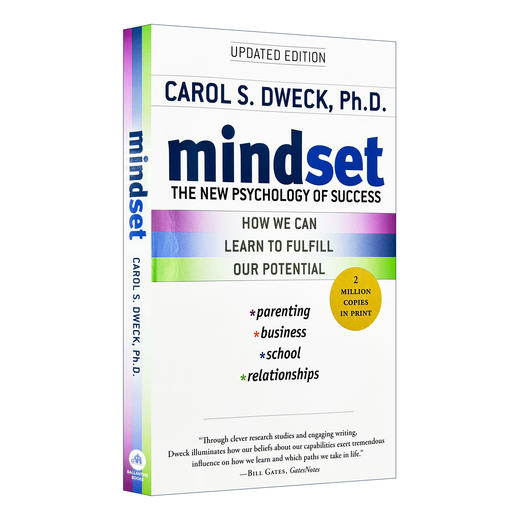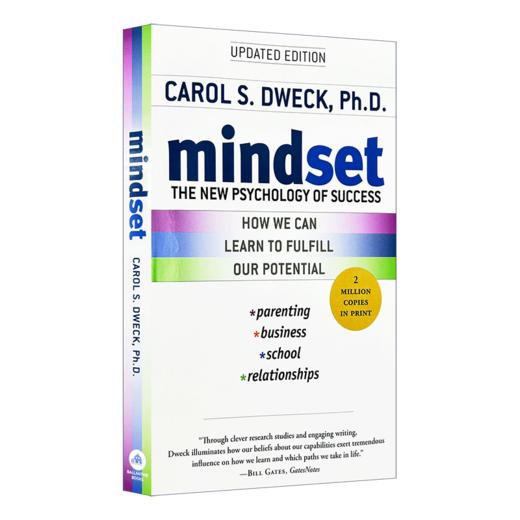终身成长 重新定义成功的思维模式 成功心理学 英文原版 Mindset 比尔盖茨推荐好书 卡罗尔德韦克 Carol Dweck 英语原版进口书籍
| 运费: | ¥ 0.00-999.00 |
| 库存: | 135 件 |
商品详情
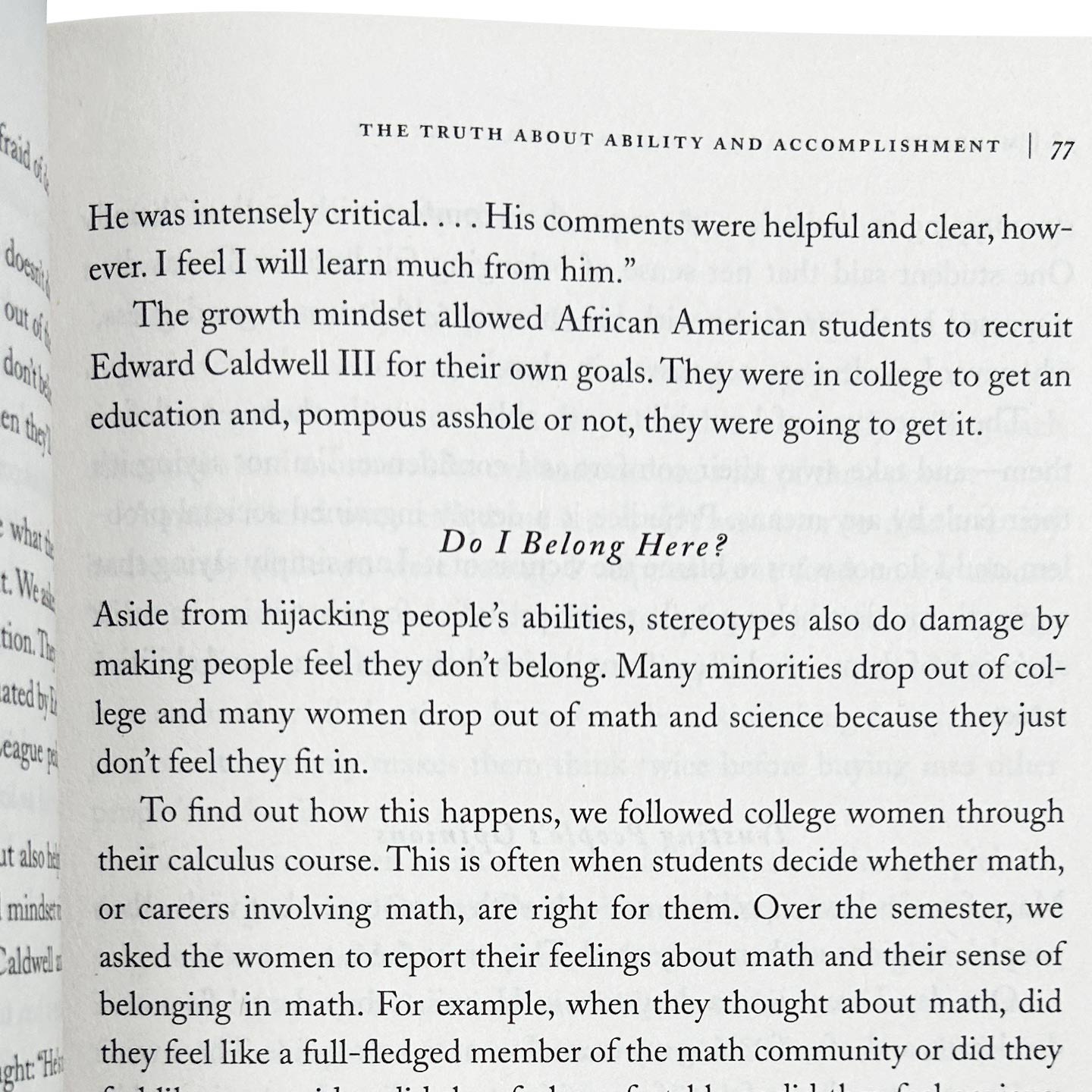
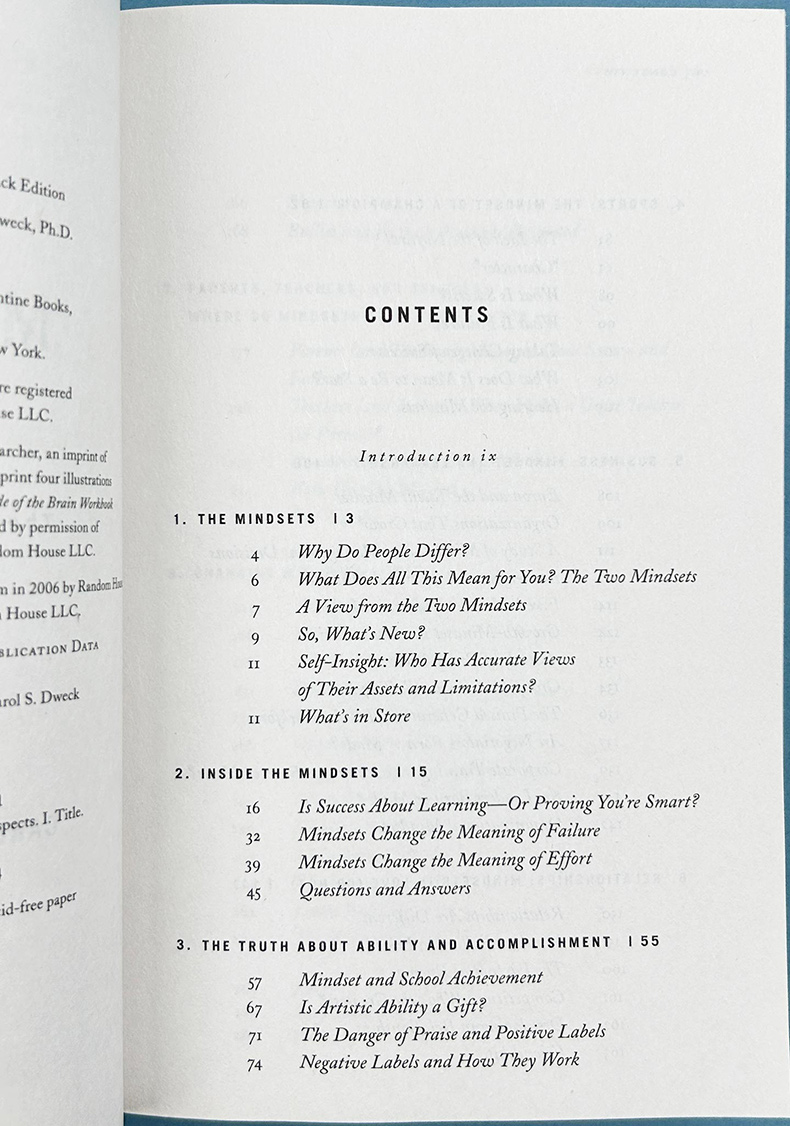
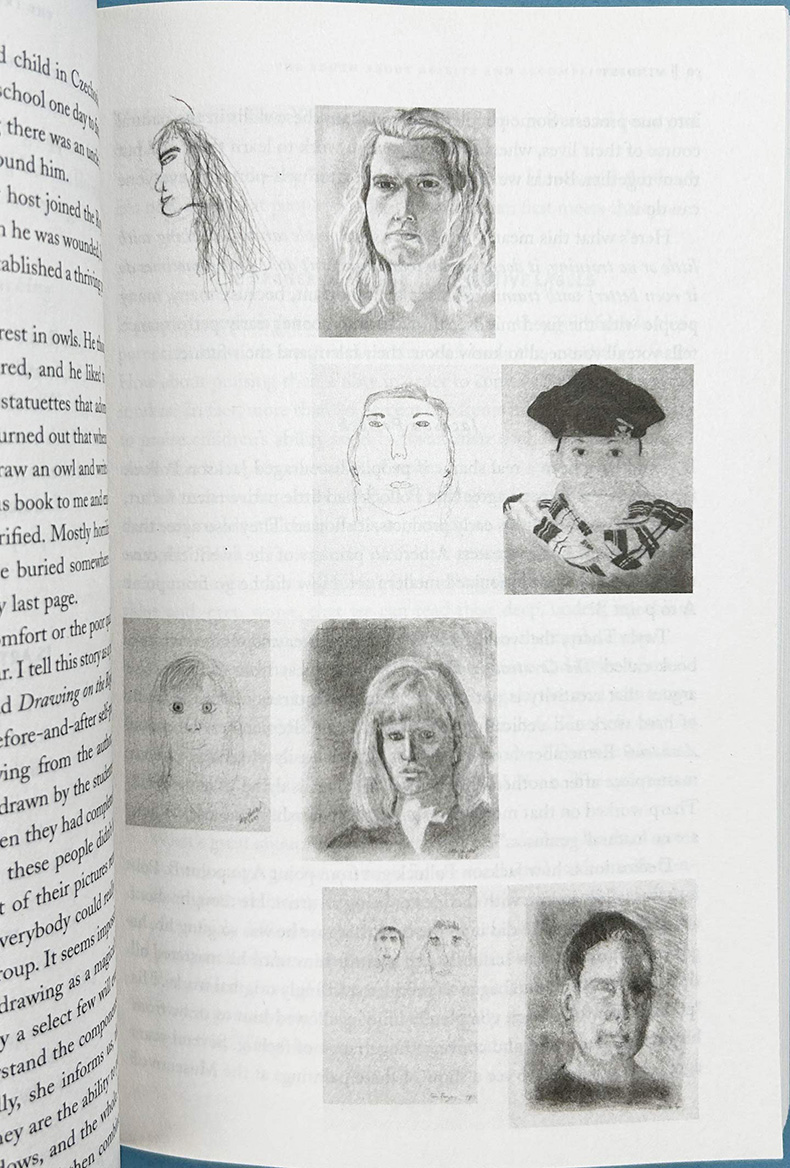

书名:Mindset: The New Psychology of Success 思维模式:全新的成功心理学
作者:Carol S. Dweck卡罗尔·德韦克
出版社名称:Ballantine Books
出版时间:2007
语种:英文
ISBN:9780345472328
商品尺寸:13.2 x 1.5 x 20.1 cm
包装:平装
页数:288 (以实物为准)

影响美国一代人的心理励志之作,被无数次引用的成功学观
美国亚马逊心理畅销书在榜10年
《时代周刊》《早安美国》《华尔街日报》热赞
比尔·盖茨撰文推荐
Mindset: The New Psychology of Success《思维模式:全新的成功心理学》是斯坦福大学心理学教授卡罗尔·德韦克总结数十年研究成果的经典作品。本书通过大量例证指导读者运用正确的思维模式在生活和事业上获取成功,实用性强;是提高个人及组织正向力、社交力、领导力以及教育能力的经典读本。
成功不在先天,不靠外在,关键在于思维模式:是满足于现有成果、避免失败可能的固定型,还是以努力为豪、寻求挑战机会的成长型,决定了你能在成功路上走多远。
夸孩子“你好聪明”还是“你真用功”更有意义?
如果一段感情需要努力经营,意味着我们注定不适合在一起?
一位天才老板带领一群天才员工,就一定能缔造卓越?
思维模式的不同影响着我们生活和工作的方方面面,而你有充分的机会与可能扭转自己的思维模式,改变前进的方向。
名人推荐
“我爱这本书的一个原因是,它不仅提供了理论,还阐明了方法。德韦克帮助固定型思维模式者转变为成长型思维模式者的方法表明,仅仅对成长型思维模式进行一番深入了解,你就能让自己的思想和生活彻底改变。” ——比尔·盖茨
“德韦克的重大发现是,我们通常具有两种思维模式中的一种:认为自己的智力是一种固定属性,或认为它是可以培养并随着时间增长的。” ——马尔科姆·格拉德威尔(Malcolm Gladwell),记者、畅销书作者和演讲家
“你会发现在关于动力的著作中,本书是数一数二的。” ——《关键教养报告》(Nurture Shock)作者波·布朗森(Po Bronson)
“如果你是个管理者,或在养育孩子(这也算一种管理),放下手边的一切,读读这本书吧。” ——《创业的艺术》(The Art of the Start)作者盖伊·川崎(Guy Kawasaki)
“每个人都该读这本书。” ——《让创意更有黏性》(Made to Stick)作者奇普·希思(Chip Heath)、丹·希思(Dan Heath)
“德韦克对智力与思维模式的研究影响了我生活中的方方面面。” ——《全新思维》(A Whole New Mind)和《驱动力》(Drive)作者丹尼尔·平克(Daniel Pink)
“一本好书会让你赞同,一本伟大的书会让你遵从,而这本书提出的建议会改变你的一生。” ——耶鲁大学心理学教授罗伯特·J.斯滕伯格(Robert J. Sternberg)
Now updated with new research—the book that has changed millions of lives
After decades of research, world-renowned Stanford University psychologist Carol S. Dweck, Ph.D., discovered a simple but groundbreaking idea: the power of mindset. In this brilliant book, she shows how success in school, work, sports, the arts, and almost every area of human endeavor can be dramatically influenced by how we think about our talents and abilities. People with a fixed mindset—those who believe that abilities are fixed—are less likely to flourish than those with a growth mindset—those who believe that abilities can be developed. Mindset reveals how great parents, teachers, managers, and athletes can put this idea to use to foster outstanding accomplishment.
In this edition, Dweck offers new insights into her now famous and broadly embraced concept. She introduces a phenomenon she calls false growth mindset and guides people toward adopting a deeper, truer growth mindset. She also expands the mindset concept beyond the individual, applying it to the cultures of groups and organizations. With the right mindset, you can motivate those you lead, teach, and love—to transform their lives and your own.
Review
“This book is an essential read for parents, teachers, coaches, and others who are instrumental in determining a child’s mind-set, and in turn, his or her future success, as well as for those who would like to increase their own feelings of success and fulfillment.”— Library Journal (starred review)
“A good book is one whose advice you believe. A great book is one whose advice you follow. This is a book that can change your life, as its ideas have changed mine.” — Robert J. Sternberg, co-author of Teaching for Wisdom, Intelligence, Creativity, and Success
“Everyone should read this book.” — Chip Heath and Dan Heath, authors of Made to Stick
“One of the most influential books ever about motivation.” — Po Bronson, author of NurtureShock
“If you manage people or are a parent (which is a form of managing people), drop everything and read Mindset.” — Guy Kawasaki, author of The Art of the Start 2.0

在对成功的数十年研究后,斯坦福大学心理学家卡罗尔•德韦克发现了思维模式的力量。她在Mindset: The New Psychology of Success《思维模式:全新的成功心理学》中表明,我们获得的成功并不是能力和天赋决定的,更受到我们在追求目标的过程中展现的思维模式的影响。
她介绍了两种思维模式:固定型与成长型,它们体现了应对成功与失败、成绩与挑战时的两种基本心态。你认为才智和努力哪个重要,能力能否通过努力改变,决定了你是会满足于既有成果还是会积极探索新知。只有用正确的思维模式看待问题,才能更好地达成人生和职业目标。
德韦克揭示的成功法则已被很多具有发展眼光的父母、老师、运动员和管理者应用,并在实践中得到了验证。通过了解自己的思维模式并做出改变,人们能以简单的方式培养对学习的热情,和在任何领域内取得成功都需要的抗压力。

卡罗尔·德韦克博士是人格心理学、社会心理学和发展心理学领域内公认的杰出学者之一。她曾任哥伦比亚大学威廉·兰斯福德心理学教授,现任斯坦福大学路易斯和弗吉尼亚·伊顿心理学教授,也是美国艺术与科学院院士。她的著作《自我理论:它们如何影响动机、人格与发展》(Self-Theories: Their Role in Motivation, Personality, and Development)被世界教育联谊会(World Education Fellowship)选为年度好书。她经常为《纽约客》《时代周刊》《纽约时报》《华盛顿邮报》和《波士顿环球报》撰写文章,也曾登上美国全国广播公司的《今天》和美国广播公司的《20/20》等新闻节目。
Carol S. Dweck, Ph.D., is widely regarded as one of the world’s leading researchers in the fields of personality, social psychology, and developmental psychology. She is the Lewis and Virginia Eaton Professor of Psychology at Stanford University, has been elected to the American Academy of Arts and Sciences and the National Academy of Sciences, and has won nine lifetime achievement awards for her research. She addressed the United Nations on the eve of their new global development plan and has advised governments on educational and economic policies. Her work has been featured in almost every major national publication, and she has appeared on Today, Good Morning America, and 20/20. She lives with her husband in Palo Alto, California.

Introduction
1. The Mindsets
Why Do People Differ?
What Does All This Mean for You? The Two Mindsets
A View from the Two Mindsets
So, What’s New?
Self-Insight: Who Has Accurate Views of Their Assets and Limitations?
What’s in Store
2. Inside The Mindsets
Is Success About Learning—Or Proving You’re Smart?
Mindsets Change the Meaning of Failure
Mindsets Change the Meaning of Effort
Questions and Answers
3. The Truth About Ability and Accomplishment
Mindset and School Achievement
Is Artistic Ability a Gift?
The Danger of Praise and Positive Labels
Negative Labels and How They Work
4. Sports: The Mindset Of A Champion
The Idea of the Natural
“Character”
What Is Success?
What Is Failure?
Taking Charge of Success
What Does It Mean to Be a Star?
Hearing the Mindsets
5. Business: Mindset and Leadership
Enron and the Talent Mindset
Organizations That Grow
A Study of Mindset and Management Decisions
Leadership and the Fixed Mindset
Fixed-Mindset Leaders in Action
Growth-Mindset Leaders in Action
A Study of Group Processes
Groupthink Versus We Think
Are Leaders Born or Made?
6. Relationships: Mindsets In Love (Or Not)
Relationships Are Different
Mindsets Falling in Love
The Partner as Enemy
Competition: Who’s The Greatest?
Developing in Relationships
Friendship
Shyness
Bullies and Victims: Revenge Revisited
7. Parents, Teachers, And Coaches: Where Do Mindsets Come From?
Parents (and Teachers): Messages About Success and Failure
Children Learn The Messages
Teachers (and Parents): What Makes a Great Teacher (or Parent)?
Coaches: Winning Through Mindset
Our Legacy
8. Changing Mindsets: A Workshop
The Nature of Change
The Mindset Lectures
A Mindset Workshop
Brainology
More About Change
Taking the First Step: A Workshop for You
People Who Don’t Want to Change
Changing Your Child’s Mindset
Mindset and Willpower
Maintaining Change
The Road Ahead
Notes
Recommended Books
Index

Chapter 1
THE MINDSETS
As a young researcher, just starting out, something happened that changed my life. I was obsessed with understanding how people cope with failures, and I decided to study it by watching how students grapple with hard problems. So I brought children one at a time to a room in their school, made them comfortable, and then gave them a series of puzzles to solve. The first ones were fairly easy, but the next ones were hard. As the students grunted, perspired, and toiled, I watched their strategies and probed what they were thinking and feeling. I expected differences among children in how they coped with the difficulty, but I saw something I never expected.
Confronted with the hard puzzles, one ten-year-old boy pulled up his chair, rubbed his hands together, smacked his lips, and cried out, “I love a challenge!” Another, sweating away on these puzzles, looked up with a pleased expression and said with authority, “You know, I was hoping this would be informative!”
What’s wrong with them? I wondered. I always thought you coped with failure or you didn’t cope with failure. I never thought anyone loved failure. Were these alien children or were they on to something?
Everyone has a role model, someone who pointed the way at a critical moment in their lives. These children were my role models. They obviously knew something I didn’t and I was determined to figure it out—to understand the kind of mindset that could turn a failure into a gift.
What did they know? They knew that human qualities, such as intellectual skills, could be cultivated through effort. And that’s what they were doing—getting smarter. Not only weren’t they discouraged by failure, they didn’t even think they were failing. They thought they were learning.
I, on the other hand, thought human qualities were carved in stone. You were smart or you weren’t, and failure meant you weren’t. It was that simple. If you could arrange successes and avoid failures (at all costs), you could stay smart. Struggles, mistakes, perseverance were just not part of this picture.
Whether human qualities are things that can be cultivated or things that are carved in stone is an old issue. What these beliefs mean for you is a new one: What are the consequences of thinking that your intelligence or personality is something you can develop, as opposed to something that is a fixed, deep-seated trait? Let’s first look in on the age-old, fiercely waged debate about human nature and then return to the question of what these beliefs mean for you.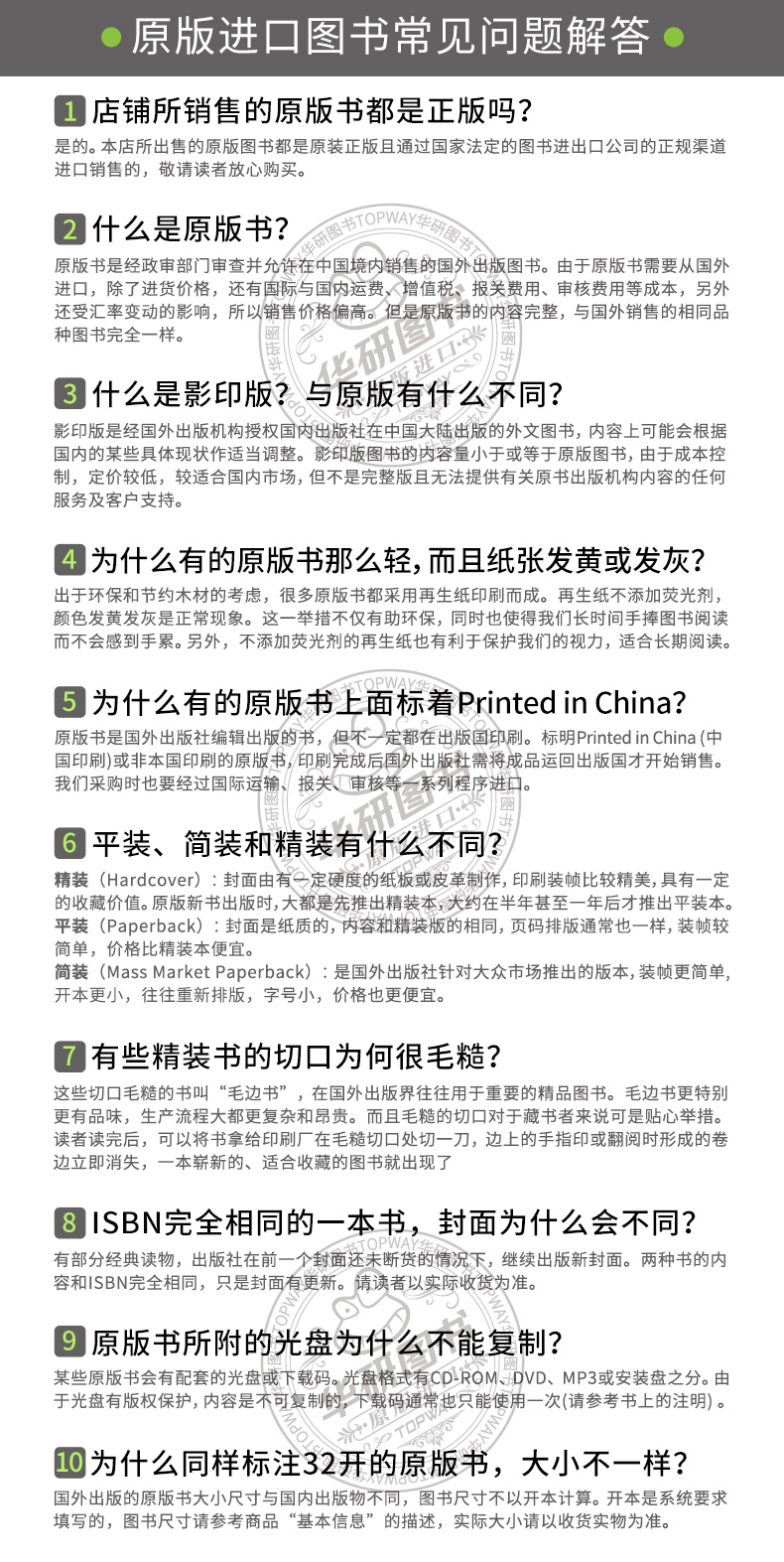
- 华研外语 (微信公众号认证)
- 本店是“华研外语”品牌商自营店,全国所有“华研外语”、“华研教育”品牌图书都是我司出版发行的,本店为华研官方源头出货,所有图书均为正规正版,拥有实惠与正版的保障!!!
- 扫描二维码,访问我们的微信店铺
- 随时随地的购物、客服咨询、查询订单和物流...
